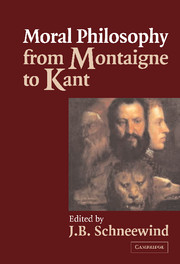Book contents
- Frontmatter
- Contents
- Preface
- Acknowledgments
- Foreword to the One-Volume Reprint
- Introduction
- PROLEGOMENA: SOME QUESTIONS RAISED
- PART I REWORKING NATURAL LAW
- PART II INTELLECT AND MORALITY
- PART III EPICUREANS AND EGOISTS
- PART IV AUTONOMY AND RESPONSIBILITY
- The Earl of Shaftesbury
- Francis Hutcheson
- Joseph Butler
- David Hume
- Christian August Crusius
- Richard Price
- Jean-Jacques Rousseau
- Thomas Reid
- Immanuel Kant
- Supplemental Bibliography
David Hume
Published online by Cambridge University Press: 05 June 2012
- Frontmatter
- Contents
- Preface
- Acknowledgments
- Foreword to the One-Volume Reprint
- Introduction
- PROLEGOMENA: SOME QUESTIONS RAISED
- PART I REWORKING NATURAL LAW
- PART II INTELLECT AND MORALITY
- PART III EPICUREANS AND EGOISTS
- PART IV AUTONOMY AND RESPONSIBILITY
- The Earl of Shaftesbury
- Francis Hutcheson
- Joseph Butler
- David Hume
- Christian August Crusius
- Richard Price
- Jean-Jacques Rousseau
- Thomas Reid
- Immanuel Kant
- Supplemental Bibliography
Summary
Introduction
Hume was born in Edinburgh in 1711. Educated at home and at the University of Edinburgh, he came early to the decision that he wanted a career as a man of letters, and not in a profession like the law. At the age of eighteen he became convinced that he had an idea for a major philosophical work. He brooded constantly on this idea and its ramifications, eventually moving to France in 1734 because there he could live on his small independent income and devote himself to writing down his thoughts. Hume returned to Scotland in 1737 with his book essentially complete. It was published in three volumes in 1739–40 as A Treatise of Human Nature. Hume's hope that it would bring him recognition in the literary world was disappointed, however. His book received little attention, and of that most was unfavorable.
As a result, Hume rewrote his book, recasting the first part, which covered epistemology, into the Philosophical Essays Concerning Human Understanding (later entitled An Enquiry Concerning Human Understanding), published in 1748, and the third part, on ethics, into An Enquiry Concerning the Principles of Morals (1751). He also wrote a number of essays on politics, history, economics, aesthetics, and other topics. These, with the rewritten versions of his philosophy, finally brought him literary recognition. During the 1750s Hume wrote his other major philosophical work, the Dialogues Concerning Natural Religion, which was not published until 1779, after his death. Its companion piece, the Natural History of Religion, was published in 1757.
- Type
- Chapter
- Information
- Moral Philosophy from Montaigne to Kant , pp. 545 - 567Publisher: Cambridge University PressPrint publication year: 2002

